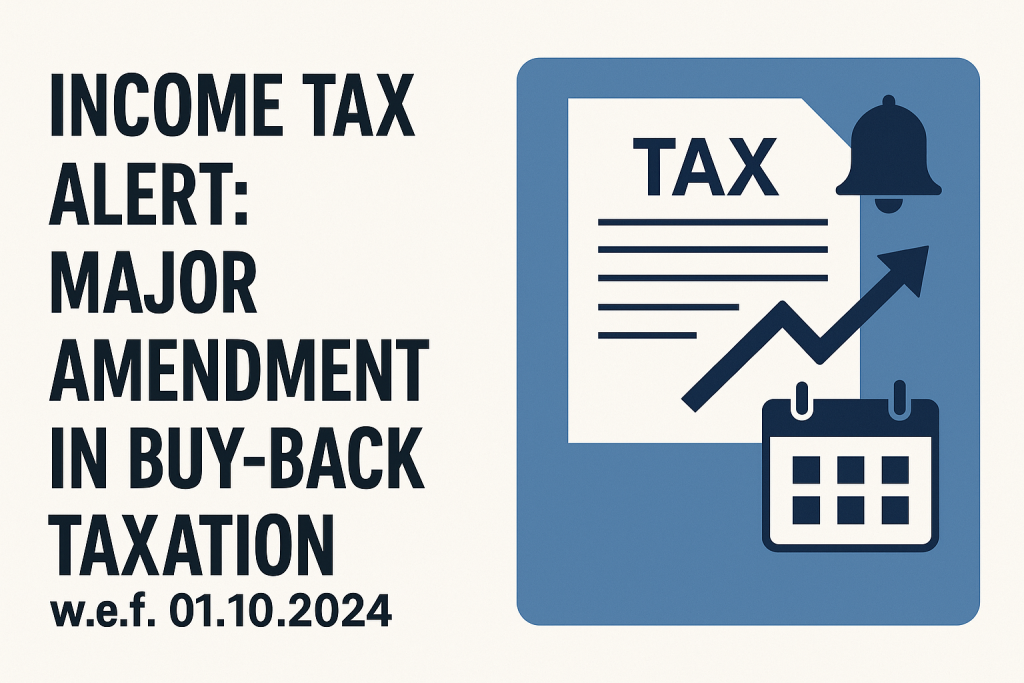Income Tax Alert: Major Amendment in Buy-Back Taxation w.e.f. 01.10.2024
In a significant move that reshapes the tax landscape for shareholders and companies, the Finance Act has amended the provisions relating to share buy-backs, effectively omitting Section 115QA of the Income Tax Act, 1961, from October 1, 2024. This change is bound to impact startup founders, promoters, HNIs, and corporate investors who frequently engage in buy-back transactions.
Let’s understand what this means in simple terms:
🔴 What Was the Earlier Scenario?
Earlier, when a company bought back its shares, Section 115QA levied a 20% buy-back tax (plus surcharge and cess) on the company. Shareholders were exempt from tax on such income, as the tax was paid at the company level.
✅ Company paid the tax
❌ Shareholder paid nothing
✅ What Changes from 01.10.2024?
Section 115QA has been omitted, and now the taxation burden shifts from the company to the shareholders.
Under the new mechanism:
- The shareholder receiving buy-back consideration will now be liable to pay tax.
- The entire amount received will be taxed as “Deemed Dividend” under Section 2(22)(f).
🧾 Deemed Dividend Taxation – Section 2(22)(f)
Here’s how the income will now be taxed:
- The entire buy-back amount (not just profit) is treated as deemed dividend.
- Taxed under the head “Income from Other Sources”.
- No deductions allowed under Section 57 — meaning, expenses like legal fees, demat charges, brokerage, etc., cannot be reduced from this income.
- Tax rates will be as per the slab applicable to the individual.
📉 What Happens to Capital Gains? – Section 46A Amended
Under the earlier regime, shareholders paid capital gains tax based on the difference between buy-back price and acquisition cost.
Now, after the amendment to Section 46A, the buy-back consideration will be treated as NIL for computing capital gains.
So, the calculation becomes:
Capital Gain = NIL (deemed consideration) – Cost of Acquisition
This means the entire cost of shares becomes a capital loss, which can be used:
- To set off against other capital gains in the same year, or
- Carried forward for 8 years as per capital loss rules.
But this capital loss must be reported separately from dividend income.
🔍 TDS Applicability on Buy-Back
Since the shareholder is now taxable:
- TDS @ 10% will be deducted on the buy-back amount for resident shareholders under Section 194.
- For non-resident shareholders, Section 195 applies — and DTAA benefits may be claimed where applicable.
📌 How Should Shareholders Report in ITR?
This change will impact ITR filing for FY 2024-25 (AY 2025-26). Taxpayers should be cautious to avoid mismatches or notices.
📂 Reporting Guide:
- Schedule OS – Report the buy-back amount as “Deemed Dividend” under “Income from Other Sources”.
- Schedule CG – Report capital loss (due to NIL deemed consideration) from buy-back under Capital Gains.
- Maintain TDS certificates to claim credit.
- Ensure no double reporting.
🎯 Who Does This Impact the Most?
This major policy shift will particularly affect:
- Startup Founders and Promoters
- Angel Investors and VCs
- High Net-Worth Individuals (HNIs)
- Private Limited Companies engaged in buy-back
Professional advice is strongly recommended for those engaging in buy-backs post 01.10.2024.
📌 Final Thoughts
This amendment aims to bring equity between different forms of profit distribution (dividend vs. buy-back) by aligning their tax treatment.
While it reduces the tax outgo for companies, it increases compliance and tax burden for shareholders.
🧾 Rationale Behind the Amendment(For Professionals and Deeper Understanding)
The amendment to omit Section 115QA and shift the tax burden from companies to shareholders is rooted in the government’s broader objective of widening the tax base and ensuring parity in the tax treatment of income distribution.
Here’s the policy rationale as highlighted in the Memorandum to the Finance Bill, 2024:
- Alignment with Dividend Taxation:
Buy-back of shares and dividend distributions are both methods for companies to return accumulated profits to shareholders. Post abolition of Dividend Distribution Tax (DDT) in 2020, dividends are taxed in the hands of shareholders. A similar logic is now extended to buy-back transactions. - Taxing the Recipient Instead of the Company:
Representations were received suggesting that the buy-back amount should be taxed in the hands of shareholders, just like dividends, instead of taxing the company. This brings consistency in taxing income at the point of receipt. - Recognition of Capital Loss on Extinguished Shares:
When a company buys back shares, shareholders relinquish their rights in those shares. This is effectively an extinguishment of a capital asset, and hence the cost of acquisition must be accounted for.
The amendment provides that:
- The buy-back consideration will be deemed as NIL for capital gains purposes.
- This leads to a capital loss equal to the cost of acquisition.
- This capital loss can be carried forward and set off against future capital gains as per existing provisions.
4. Anti-Avoidance and Fair Taxation:
The move ensures that no double non-taxation occurs—companies no longer escape tax via buy-backs (compared to dividends), and shareholders appropriately report and pay taxes on the income they effectively receive.
In essence, the amendment aims to rationalize the tax treatment of distributions by domestic companies, curb tax arbitrage between dividend and buy-back routes, and bring clarity and equity in taxation of capital extinguishment.




